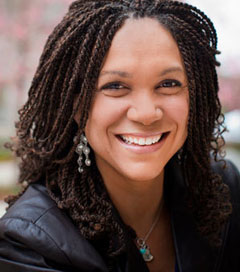Melissa V. Harris-Perry: I am not a huge fan of the role model theory. Part of what I find extraordinary about black history in America has been the ability to imagine freedom, equality, and full humanity even when there was no living model. The capacity for moral and political imagination always outweighs the influence of role models in my mind.
That said, American history is replete with black women who have carved out authentic space for themselves in deeply unequal circumstances. I am particularly inspired the scholar, journalist, wife, mother, activist, writer and deeply human Ida B. Wells.
MK: You focus on three stereotypes: the promiscuous temptress, the kindly mammy, the angry Amazon woman. Why did you pick these specific stereotypes?
MVHP: Amazon huh? I am not sure I think the angry black woman is Amazon like, because unlike Amazons she does not have power and authority, just a biting tongue and sarcastic wit. My decision to focus on Jezebel, mammy and the angry black woman was based on the research. These are the primary stereotypes that dominate literary and cultural references. These are also the stereotypes that women in my focus groups told me had the greatest impact on their lives.
MK: How do black women develop in reaction to these stereotypes? How do some balance their lives and others overcompensate and others fail?
MVHP: I don't think some women succeed and other fail. I think all of us succeed in moments and fail in other moments. Or succeed in some aspects of our lives and fail in others. I reject any totalizing judgments of people who are struggling against such profoundly embedded negative stereotypes. My research tells me that some individuals have a variety of psychological and cultural resources that make them more resilient than others. But, because I am interested in political consequences of these stereotypes I spend less time writing about individual strategies than thinking through collective consequences of our difficult process of finding authentic political expression within contemporary American discourse.
MK: The role of black women and citizenship – and the challenge of negotiating stereotypes in politics – is central to your book. You mention how right-wing columnist and radio host Cal Thomas is typical of whites who use stereotypes to “kill the message” by putting the messenger in a cage. Thus, a black women who is angry on behalf of a cause is reduced to just being a stereotypical “Amazon.” The cause gets lost in the stereotype. How do black female politicians overcome this?
MVHP: Again, I don't think I ever suggest Cal Thomas is typical of whites or typical of any given group, just that he is an example of this process of relegating black women's anger to a stereotypical reaction rather than an authentic complaint. Ignoring the content of black women's anger is certainly not just a problem of someone like Cal Thomas, it happens within black communities all the time. When black women express their anger at inequality or poor treatment they are often seen as irrational, spiteful and ridiculous. But this is as likely to happen on black urban radio as it is on Fox News. Still, anger is certainly a dual edged blade for black women in politics. Politicians need to be passionate advocates for their causes, but that passion can often be misread and therefore dismissed as irrational when it comes from black women. We can see many different ways that black women elected officials have dealt with this. Some have embraced their “anger” as a defining aspect of their political personas. Others have tamped down and present almost preternatural calm exteriors in all circumstances.
MK: Michelle Obama is, of course, discussed in your book (Chapter 8). She has seemed to strategically avoid even the hint of being strident in her voice or actions. Yet, the stereotypes continue due to her having such things as muscle-toned arms or even her encouraging of sustainable organic gardening. Isn't there a cul-de-sac for some black women, particularly in politics? They just can't escape stereotypes, no matter how they act?
MVHP: I think this is true for all black women, whether they are in public life or not. These stereotypes don't exist because they are accurate representations of black women. They exist because they serve the goal of maintaining racial and gender inequality. You can't overcome a stereotype by acting opposite of it. The point is not to convince other people that you are worthy of being a fully participating citizen, the point is to convince yourself of that truth and to act and organize accordingly.
MK: On a personal note, congratulations on your new MSNBC show. We can assume, like Paul Krugman, you won't be giving up your high-profile and highly respected academic career? Is that correct?
MVHP: Correct. I will never leave the academy. Professionally, I am a professor first. I love living in New Orleans and teaching at Tulane. Part of why I am so pleased to have the opportunity for a weekend show is because I don't have to give up teaching.
Join us in defending the truth before it’s too late
The future of independent journalism is uncertain, and the consequences of losing it are too grave to ignore. To ensure Truthout remains safe, strong, and free, we need to raise $46,000 in the next 7 days. Every dollar raised goes directly toward the costs of producing news you can trust.
Please give what you can — because by supporting us with a tax-deductible donation, you’re not just preserving a source of news, you’re helping to safeguard what’s left of our democracy.
